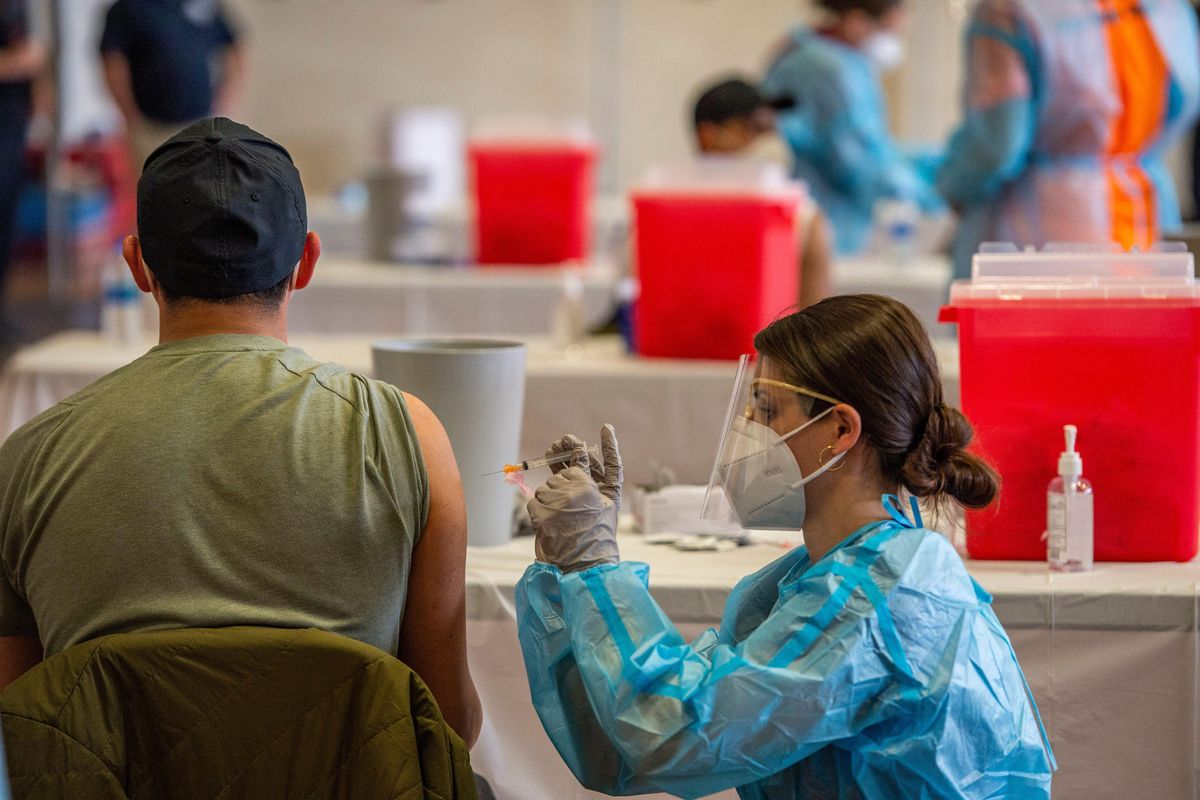The Covid-19 vaccine rollout shows wealth means health in America. Biden must change this
Those in poorer communities die sooner, simply because the infrastructure and supply chains to enable them to live healthy lives aren't there

Pharmacy student helps to vaccinate almost 700 people throughout the day at Central Falls High School in Central Falls, Rhode Island
ُThe clearest example of the infrastructure-health relationship is the vaccine rollout, where there are clear socio-economic barriers to everyone getting the jab. One of the logistical difficulties of the Pfizer vaccine is that it requires cold storage facilities. Facilities that often only the metropolitan hospitals in affluent areas can afford, at a cost of approximately $10,000 to $15,000 a unit.
More rural hospitals are being told to forgo the investment, and wait for other (potentially less effective) vaccines that do not require cold storage. This will cost lives directly as well as indirectly, as lockdowns and restrictions will be in place longer in these poorer neighborhoods.
But vaccine logistics are just the tip of the iceberg in how poor infrastructure means poorer Americans have poor health.
Two of the largest risk factors for suffering COVID-related health complications are high blood pressure and obesity. America has an abundance of 'food deserts'; places defined by the USDA where at least a third of the population lives greater than one mile away from a supermarket for urban areas, or greater than 10 miles for rural areas. 19 million (often poor) Americans can't even easily buy fresh groceries - and many of them will pay the price with their health.
At the same time, fast food outlets have been given free reign to extend into lower income communities. Lyndon Johnson's 1964 Equal Opportunity Loan program extended cheap loans to the public if they started fast food franchises, leading to a spike in poorer communities.
Liquor stores are as plentiful as fast food in America's most deprived zip codes. Various studies have shown how there are almost twice as many liquor stores in poorer, non-white communities.
The four key lessons from Covid that should shape policy decisions everywhere

All crises have gendered impacts – simply put, they affect women and men, girls and boys in different ways. COVID-19 is no different.
Whilst the infrastructure for poor Americans to buy fresh fruit and vegetables is lacking, the infrastructure for excessive drinking and unhealthy eating is world-leading.
The lack of public, outside gyms and recreation centers is another reason why wealth means health in America. Only richer towns can afford these, and with the average cost of a gym at $58 per month, it is no surprise that a National Health Interview survey shows how only 11% of those who are below the poverty threshold are likely to meet the daily exercise guidance, whereas those who are above the poverty are three times as likely to do so.
A lot of these problems could be solved by infrastructure and supply chains - parts of our national policy that can transform lives if they are prioritized.
As a supply chain expert, my job is to make supply chains more robust, and ensure that products and services get where they are most needed. Whilst companies like WalMart and Amazon have done a remarkable job of digitizing and developing their supply chains through the pandemic, our national health strategy has not done the same.
Ultimately, by developing our supply chains and infrastructure to ensure that Americans have better access to not only healthcare but the means to prevent health issues in the first place, more Americans can choose to improve their health chances if they wish.
This should be a national effort and seen as just as essential as defense or schooling. We can reduce the health-wealth inequality gap by investing in green grocer loans, and by cutting back on distributing loans for the expansion of fast food franchises. There should also be low-interest loans made available for those who wish to start gyms or sports facilities in low-income communities.
Better health pays for itself. Obesity is estimated to have cost the U.S. economy almost $1.7 trillion in 2018; almost 10% of our nation's GDP.
If the new administration really wants to build back better, this should start by making sure that our infrastructure can lead this rebuilding.
Wealth can guarantee many things, but a healthy lifestyle should be an option for all Americans.
Have you got something to say? Want to see your writing here? Submit a post to Conversations today.


